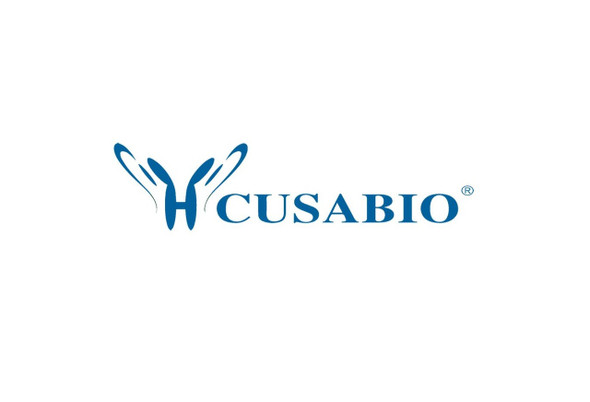Cusabio Human Recombinants
Recombinant Human C-C chemokine receptor type 4 (CCR4) | CSB-CF004843HU
- SKU:
- CSB-CF004843HU
- Availability:
- 3 - 7 Working Days
Description
Recombinant Human C-C chemokine receptor type 4 (CCR4) | CSB-CF004843HU | Cusabio
Alternative Name(s): K5-5 CD_antigen: CD194
Gene Names: CCR4
Research Areas: Others
Organism: Homo sapiens (Human)
AA Sequence: MNPTDIADTTLDESIYSNYYLYESIPKPCTKEGIKAFGELFLPPLYSLVFVFGLLGNSVVVLVLFKYKRLRSMTDVYLLNLAISDLLFVFSLPFWGYYAADQWVFGLGLCKMISWMYLVGFYSGIFFVMLMSIDRYLAIVHAVFSLRARTLTYGVITSLATWSVAVFASLPGFLFSTCYTERNHTYCKTKYSLNSTTWKVLSSLEINILGLVIPLGIMLFCYSMIIRTLQHCKNEKKNKAVKMIFAVVVLFLGFWTPYNIVLFLETLVELEVLQDCTFERYLDYAIQATETLAFVHCCLNPIIYFFLGEKFRKYILQLFKTCRGLFVLCQYCGLLQIYSADTPSSSYTQSTMDHDLHDAL
Source: in vitro E.coli expression system
Tag Info: N-terminal 10xHis-tagged
Expression Region: 1-360aa
Sequence Info: Full Length
MW: 44.9 kDa
Purity: Greater than 85% as determined by SDS-PAGE.
Relevance: High affinity receptor for the C-C type chemokines CCL17/TARC, CCL22/MDC and CKLF isoform 1/CKLF1. The activity of this receptor is mediated by G(i) proteins which activate a phosphatidylinositol-calcium second messenger system. Can function as a chemoattractant homing receptor on circulating memory lymphocytes and as a coreceptor for some primary HIV-2 isolates. In the CNS, could mediate hippocampal-neuron survival.
Reference: "The T cell-directed CC chemokine TARC is a highly specific biological ligand for CC chemokine receptor 4." Imai T., Baba M., Nishimura M., Kakizaki M., Takagi S., Yoshie O. J. Biol. Chem. 272:15036-15042(1997)
Storage: The shelf life is related to many factors, storage state, buffer ingredients, storage temperature and the stability of the protein itself. Generally, the shelf life of liquid form is 6 months at -20?/-80?. The shelf life of lyophilized form is 12 months at -20?/-80?.
Notes: Repeated freezing and thawing is not recommended. Store working aliquots at 4? for up to one week.
Function: High affinity receptor for the C-C type chemokines CCL17/TARC, CCL22/MDC and CKLF isoform 1/CKLF1. The activity of this receptor is mediated by G(i) proteins which activate a phosphatidylinositol-calcium second messenger system. Can function as a chemoattractant homing receptor on circulating memory lymphocytes and as a coreceptor for some primary HIV-2 isolates. In the CNS, could mediate hippocampal-neuron survival.
Involvement in disease:
Subcellular Location: Cell membrane, Multi-pass membrane protein
Protein Families: G-protein coupled receptor 1 family
Tissue Specificity: Predominantly expressed in the thymus, in peripheral blood leukocytes, including T-cells, mostly CD4+ cells, and basophils, and in platelets; at lower levels, in the spleen and in monocytes. Detected also in macrophages, IL-2-activated natural killer cells and skin-homing memory T-cells, mostly the ones expressing the cutaneous lymphocyte antigen (CLA). Expressed in brain microvascular and coronary artery endothelial cells.
Paythway: Chemokinesignalingpathway
Form: Liquid or Lyophilized powder
Buffer: If the delivery form is liquid, the default storage buffer is Tris/PBS-based buffer, 5%-50% glycerol. If the delivery form is lyophilized powder, the buffer before lyophilization is Tris/PBS-based buffer, 6% Trehalose, pH 8.0.
Reconstitution: We recommend that this vial be briefly centrifuged prior to opening to bring the contents to the bottom. Please reconstitute protein in deionized sterile water to a concentration of 0.1-1.0 mg/mL.We recommend to add 5-50% of glycerol (final concentration) and aliquot for long-term storage at -20?/-80?. Our default final concentration of glycerol is 50%. Customers could use it as reference.
Uniprot ID: P51679
HGNC Database Link: HGNC
UniGene Database Link: UniGene
KEGG Database Link: KEGG
STRING Database Link: STRING
OMIM Database Link: OMIM









